
Полная версия
Whicker’s War
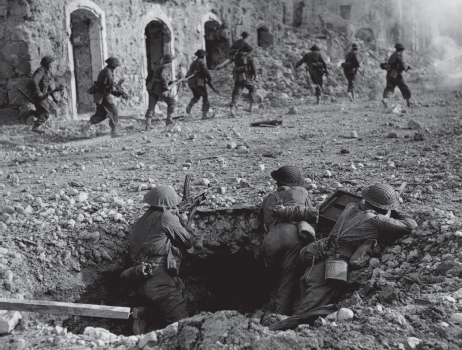
Infantrymen clear a village, covered by a Bren gunner and a couple of riflemen.
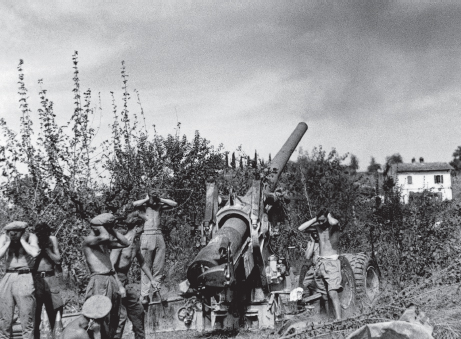
The Royal Artillery’s 155mm gun goes into action.
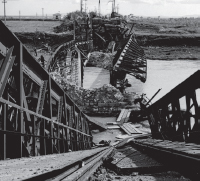
Throughout the length of Italy German engineers delayed our advance by blowing every bridge in our path.
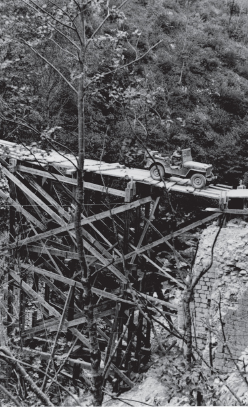
The Royal Engineers’ first solution sometimes looked slightly insecure …
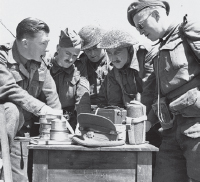
Briefing AFPU cameramen on how we’ll cover the next battle. The regulation De Vry cine-camera, next to water bottle.
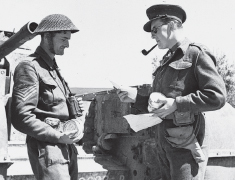
Sergeant Radford had been filming a Regiment of Churchill tanks in action. His film stock is replenished …
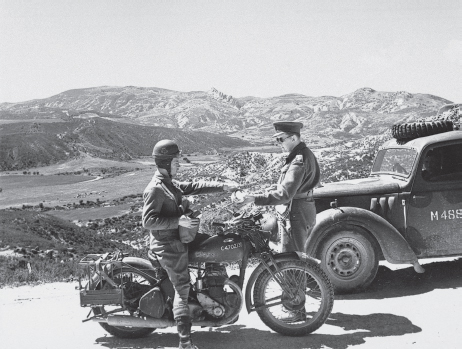
… and the footage he has shot is taken by dispatch rider back to the Developing Section at base.
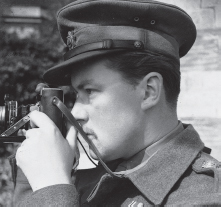
We were issued with Super Ikontas, inadequate cameras without telephoto lenses.
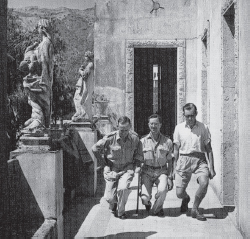
Celebrating our Sicilian victory at Casa Cuseni in Taormina, while awaiting the invasion of Italy. We even had time to perfect the Unit’s ‘Silly Walks’ – some 30 years before Monty Python.
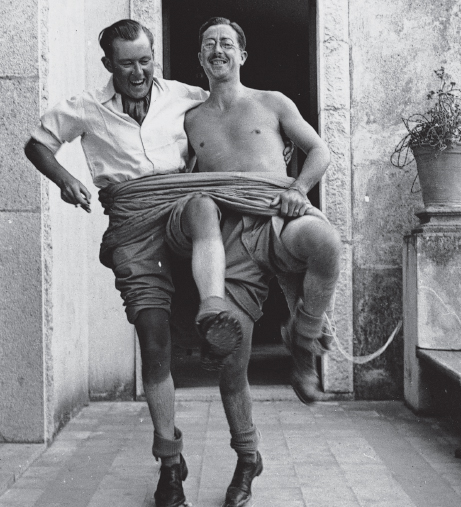
I can’t remember the reason for this outburst of warrior’s relaxation. (It was in the morning, so demon vino was no excuse). Excessive exuberance, perhaps.
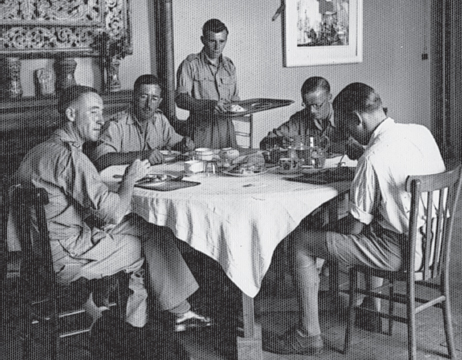
The Mess dining room, 60 years ago. Today, unchanged, even the pictures are the same …
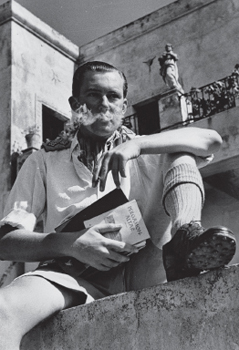
… as is the terrace. In those days …
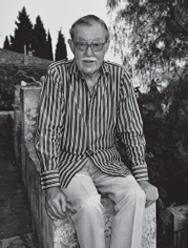
… and now.
I thought we had got away with it until my contraband car was admired at embarrassing length – by King George VI. As I stood to attention before His Majesty, it seemed cruel that the only finger of suspicion should be Regal.
The King had just arrived in Tunis at the start of his Mediterranean tour with Sir James Grigg and Sir Archibald Sinclair. In the welcoming cortège at the airport he spotted my unusual Afrika Korps convertible and pointed it out to General Alexander: ‘That’s a fine car,’ said His Majesty. ‘Very fine.’ The General, compact and elegant, studied it for what seemed a long time. Following his eyeline, all I could see was my phone number growing larger under Royal inspection.
‘Yes Sir,’ he said, finally. ‘A German staff car captured near here by this young officer, I should imagine.’ He gave me a thoughtful look – then they all drove away in a flurry of flags and celebration. I took the phoney car in the opposite direction, quite fast.
It transported me in comfort for some happy weeks until, parked one afternoon outside the office of the Eighth Army News in Tunis it was stolen by – I discovered years later – a brother officer from the Royal Engineers. Stealing captured transport from your own side has to be a war crime.
The King sailed to Malta in the cruiser Aurora, and we scrambled to reach Tripoli by road in time to cover his reception there. The Libyan capital was a cheerless contrast to exuberant Tunis, where they loved us. Streets had to be cleared of sullen Tripolitanians who evidently much preferred Italian occupation. I waited for the arrival ceremony in an open-air café and for the first time heard the wartime anthem ‘Lili Marlene’, played for British officers by a bad-tempered band. It felt strange to be unwelcome – after all, we were liberators.
The immaculate King was greeted by General Montgomery, who as usual dressed down for the occasion: smart casual – shirt, slacks, black Tank Corps beret, long horsehair flywhisk.
Filming with us was our new commanding officer, Major Geoffrey Keating, who became a close friend until his death in 1981. Keating had cut a brave figure in the desert; his photographs and those of his cameramen first made the unusual and unknown Montgomery a national hero. In truth, with high-pitched voice and uneasy birdlike delivery, he was a man with little charm or charisma. He seemed unable to relate to his troops, though on occasion he would try – proffering packets of cigarettes abruptly from his open Humber. However, he was a winner – and because of AFPU was the only publicly recognisable face in the whole Eighth Army.
Montgomery would never start a battle he was not sure of winning, so his men – who had suffered more than their ration of losing Generals – followed him cheerfully. His main military principle was that Army commanders should plan battles – not staff officers and certainly not politicians. Unsurprisingly he was not too popular with his Commander, Winston Churchill, who since Gallipoli and South Africa had longed to control troops in action.
On top of all his achievements, Churchill had a lifetime yearning to become a warrior-hero. He did not hide this improbable dream. An early biographer wrote, ‘He sees himself moving through the smoke of battle, triumphant, terrible, his brow clothed with thunder, his Legions looking to him for victory – and not looking in vain. He thinks of Napoleon; he thinks of his great ancestor the Duke of Marlborough …’
After the Gallipoli disaster in the Great War he did achieve a few months of frontline battle as a Lieutenant Colonel commanding a Rifle battalion in France. Ever afterwards he looked for another commanding role on some dramatic battlefront. At last Anzio emerged – the assault landing no one wanted. We who went there soon understood why.
Keating had flown to London with his victorious General and returned with the news that, as expected, we were about to assault Italy. The Eighth Army, the US Seventh Army and the 1st Canadian Corps would first attack Sicily, that hinge on the door to Europe, and then pursue the enemy north towards the Alps.
Invasion forces for Operation Husky were gathering at Mediterranean ports from Alexandria to Gibraltar, so I left hateful Tripoli with a convoy of new AFPU jeeps just off a ship from the States and headed flat-out across the desert back to Sousse, from where our invasion fleet would sail.
At the Libyan border we slipped off Mussolini’s tarmac road on to the sandy track through Tunisia. This had been deliberately left in poor condition by the French to slow Mussolini’s armoured columns – or that was their excuse. Through Medenine and the Mareth Line the hot desert which had so recently been a desperate battlefield and seen the last hurrah of the Afrika Korps now stood quiet and empty. It was dotted with the hulks of tanks and armoured cars, and the occasional rough wooden cross: a few sad square feet of Britain or America, Italy or Germany.
Sousse was bustling as XIII Corps got ready to fight again. We placed cameramen with the battalions which were to lead the invasion. I was to land with the famous 51st Highland Division which had battled 2,000 miles across North Africa from El Alamein. The Scots are rather useful people to have on your side if you’re expecting to get into a fight, and I was promised a noisy time.
Before the armada sailed I dashed back to Sidi Bou Saïd with secret film we had taken of the invasion preparations for dispatch to London. Coated with sand and exhausted, I arrived at our requisitioned hillside villa to find a scene of enviable tranquillity: on the elegant terrace overlooking the Bay, AFPU’s new Adjutant was giving a dinner party.
At a long table under the trees sat John Gunther, the Inside Europe author then representing the Blue radio network of America, Ted Gilling of the Exchange Telegraph news agency who was later to become my first Fleet Street Editor, and other Correspondents. In the hush of the African dusk, the whole scene looked like Hollywood.
After a bath I joined them on the patio as the sun slipped behind the mountains, drinking the red wine of Carthage and listening to cicadas in the olive groves. In a day or two I was to land on a hostile shore, somewhere. Would life ever again be as tranquil and contented and normal? Would I be appreciating it-or Resting in Peace?
Watching the moon rise over a calm scene of good fellowship, it was hard not to be envious of this rear-echelon going about its duties far from any danger and without dread of what might happen in the coming assault landing. Dinner would be on the table tomorrow night as usual, and bed would be cool and inviting. I had chosen military excitement – but forgotten that in the Army the hurly-burly of battle always excluded comfort and well-ordered certainty. I took another glass or two of Tunisian red.
Back in Sousse next day, envy forgotten, I boarded my LST-the Landing Ship Tank. This was the first use of the British-designed American-built amphibious craft that was to be the star of every invasion across the world. A strange monster with huge jaws – a bow that opened wide and a tongue that came down slowly to make a drawbridge. Only 328 feet in length, powered by two great diesels, it could carry more than 2,000-tons of armour or supplies through rough seas and with shallow draught, ride right up a beach, vomit its load onto the shore, and go astern. Disembarking troops or armour was the most dangerous part of any landing, so was always fast. Sometimes, frantic.
Anchored side by side this great fleet of LSTs filled the harbour. Once aboard I wandered around sizing-up my fellow passengers. They were all a bit subdued, that evening. An assault landing against our toughest enemy was rather like awaiting your execution in the morning; there was not much spare time for trivial thoughts or chatter.
We were in the first wave, and the approaching experience would surely be overwhelming enough, even if we lived through it. During that soft African twilight there was little shared laughter.
THEY ASKED FOR IT – AND THEY WILL NOW GET IT…
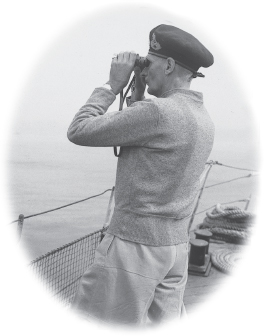
The fleet sailed at dusk on July 9, ’43, setting off in single file, then coming up into six lines. The senior officer on each ship paraded his troops and briefed them on the coming assault landing. We were to go in at Pachino, the fulcrum of the landing beaches at the bottom right-hand corner of Sicily.
Back in the wardroom our Brigadier briefed his officers. Then, traditionally, we took a few pink gins. The intention now was to knock Italy out of the war. We were off to kill a lot of people we did not know, and who we might not dislike if we did meet; and of course, we would try to stop them killing us. ‘Could be a thoroughly sticky landing chaps,’ he said, awkwardly.
I have often wondered whether scriptwriters and novelists imitate life, or do we just read the book, see the movie – and copy them, learning how we ought to react in dramatic and unusual situations? Noël Coward showed us, with In Which We Serve; no upper lip was ever stiffer. Ealing Studios followed. Even Hollywood, in a bizarre way, looked at Gunga Din and the Bengal Lancers. We all knew about Action! but in Sicily, in real life, no one was going to shout Cut!
The armada sailed on, blacked-out and silent but for the softly swishing sea. Then the desperate night upon which so much depended changed its mind and blew up a sudden Mediterranean storm so severe (we learned later) that it convinced the enemy we could not invade next morning – but which surprisingly I do not remember at all. When you are braced for battle it does wipe away lesser worries – like being seasick, or drowning.
The storm blew itself out as abruptly as it had arrived, and I went back on deck to find we were surrounded by other shadowy craft with new and strange silhouettes which had assembled during the night. Ships had been converging from most ports in the Mediterranean, from Oran to Alex, to carry this Allied army to the enemy coast.
In the moonlight I tried to sleep on unsympathetic steel, fully dressed and sweating, lifebelt handy. Then around 4am the troops came cursing and coughing up out of the fug below decks into the grey dawn, buckling equipment and queuing for the rum ration.
Some took a last baffled glance at an unexpected Army pamphlet just distributed: ‘A Soldier’s Guide to Sicily’. Hard to keep a straight face. It was full of useful hints, like the opening hours of cathedrals, how to introduce yourself, and why you should not invade on early-closing day. It could have been a cut-price package cruise of the Med if the food had been more generous and we had not been preparing to break into Hitler’s fortress.
The Army Commander, General Montgomery, brought us back to reality. It is now easy to mock his resonant ‘good-hunting!’ calls to action, but they were penned more than sixty years ago, pre-television when reality had not begun to intrude upon Ealing Studios’ rhetoric.
Montgomery told us: ‘The Italian overseas Empire has been exterminated; we will now deal with the home country. The Eighth Army has been given the great honour of representing the British Empire in the Allied force which is now to carry out this task. Together we will set about the Italians in their own country in no uncertain way; they came into this war to suit themselves and they must now take the consequences; they asked for it, and they will now get it…’
He concluded: ‘The eyes of our families and in fact of the whole Empire will be on us once the battle starts. We will see they get good news and plenty of it. Good luck and good hunting in the home country of Italy.’
Wandering around the decks, I saw no one showing anxiety, no animosity, no heroics. There was too much to think about. Fear is born and grows in comfort and security, which were not available at that moment in the Med. Or perhaps we were all acting?
Action! was at first light on July 10 ’43 when British troops returned to Europe, wading ashore on to the sandy triangular rock that is Sicily. It was the first great invasion. Cut! came two years later, and was untidy.
The Eighth Army had 4½ divisions, the US Seventh Army 2½ Along the coast to our left the Americans and 1st Canadian Division were landing. The 231 Independent Brigade from Malta, the 50th and the 5th Divisions hit the beaches in an arc north towards Syracuse. Some 750 ships put 16,000 men ashore, followed by 600 tanks and 14,000 vehicles. We were covered, they assured us, by 4,000 aircraft. I saw very few – and most of those were Luftwaffe. I presumed, and hoped, that the RAF and the USAAF were busy attacking enemy installations and airfields elsewhere, to ease our way ashore.
While driving the enemy out of Africa the Eighth Army had settled the conflict in Tunisia by capturing the last quarter-of-a-million men of the Afrika Korps. Many could have escaped to Sicily had Hitler not ordered another fight to the death. At the end most were sensible, and surrendered – including General von Arnim with his 5th Panzer Army.
The triumphant conclusion of the North African campaign left the Allies with powerful armies poised for their next great offensive. President Roosevelt, unhappy on the sidelines, was determined to get his troops into action somewhere, and Italy provided the best targets available while building-up forces and experience for the Second Front. Despite their African victory the Allies were not yet dominant nor confident enough to invade France – certainly not the Americans, with little or no battle experience.
So at Churchill’s insistence we were to attack ‘the soft underbelly of Fortress Europe’. That’s what he called it. In the event, it was not as soft as advertised; indeed, it grew almost too hard to resist. After only just avoiding being pushed back into the sea a couple of times, we became resigned to Churchill’s brave optimism.
The strategic intention was to knock Italy out of the war and to tie down the 25 German occupying divisions – 55 in the whole Mediterranean area – which could otherwise have changed the balance of power on Russian battlefields or turned the coming Second Front in Normandy into a catastrophe.
The Germans were now compelled to withdraw units from their armies around Europe to reinforce the Italian front: the Hermann Goering Division from France, the 20th Luftwaffe Field Division from Denmark, the 42nd Jäger and 162nd Turkoman Divisions from the Balkans, the 10th Luftwaffe Field Division from Belgium … were the first to leave their positions and head for Italy. By drawing some of the Wehrmacht’s finest units into battle, we supported Germany’s hard-pressed enemies everywhere.
Mussolini’s Fascist regime had already been demoralised by the loss of its African empire and army, and if we could now drive Italy out of the war our frontier would be the Alps, and the Mediterranean route to the Middle and Far East secure. To defend Sicily with its 600 miles of coastline, the Italian General Alfredo Guzzoni had twelve divisions – ten Italian and only two German: 350,000 men, including 75,000 Germans. With Kesselring’s instant reaction, by the end of August seven fully equipped German divisions were attacking us in Sicily.
To clear our sea route to this battlefield and obtain a useful airfield, the Allies had first attacked Pantelleria, a tiny volcanic island 60 miles south of Sicily. It surrendered without a shot being fired on June 11 after severe bombing, and was found to have a garrison of 11,000 troops – a ready-made prisoner-of-war camp and an indication that Mussolini’s strategic planning could be haphazard. The only British casualty during this invasion was one soldier bitten by a mule.
Though the Allies dropped 6,570 tons of bombs on that Mediterranean rock the garrison suffered few casualties and only two of its 54 gun batteries were knocked out. Such pathetic results did not lead Allied High Command to question the efficacy of future saturation bombing.
Our landing in Sicily was also preceded by the first Allied airborne operation of any size. A parachute regiment of the 82nd Airborne Division and a British Glider Brigade were flown from Kairouan, Tunisia, in some 400 transport aircraft and 137 gliders. This daring night operation was the first ever attempted. It was not a success.
Poorly-trained pilots had to face dangerously high winds, so only twelve gliders landed near their objective, and 47 crashed into the sea; they had been cast off too early by their American towing aircraft. The fact that our aerial armada was fired-on by Allied naval vessels did not help. The 75 Dakotas also dropped the US paratroops far from their target of Gela, scattering them across Sicily.
The survivors of the Glider Force saved their part of the operation from complete disaster by causing some chaos among the defences around the Ponte Grande across the River Anapo. These elite troops removed all demolition charges from the bridge, enabling the 5th Division to drive straight across, head for Syracuse and occupy it that night with port installations little damaged.
So Sicily was a curtain-raiser for Europe’s major airborne landing at Arnhem in September ’44 – which was equally unwise and unsuccessful.
Otherwise the first great invasion was going well. Only four of our great fleet of some 3,000 ships in convoy had been torpedoed. Kesselring did not seem to have noticed our arrival. We learned later there was frenzy at the Field Marshal’s HQ – but this did not show.
At Pachino our LST came to anchor offshore. A few enemy miss-and-run spotter aircraft roared over, too high for pictures. When it grew light we needed to get closer in, so with Sgt Radford, I thumbed a lift on a smaller Landing Craft Infantry. We slipped from that into the Med, struggling armpit-deep through the gentle breakers and holding our cameras high. The LCI Captain, a young Australian Lieutenant with whom during the tense dawn I had been considering life, the future and everything, this Ozzie very decently jumped into the sea and waded behind me, holding my back-pack full of unexposed film up out of the Med.
On the continent of Europe I took my first sodden steps on the long march towards the Alps. So far, so surprisingly good.
At that stage of the war nobody knew much about assault landings, about storming ashore and facing mines on the beaches and machine guns in pillboxes backed by mortars and artillery and bombers. Despite hesitant or invisible opposition, there was a new naked sensation. Standing tense on that soft warm beach and gazing around I was ready to burrow into the sand for protection. I felt exposed and enormous – a perfect target. I could sense a million angry eyes were watching me over hidden gun barrels, trigger-fingers tightening. Who would fire first?
We had been prepared for everything – except an invisible enemy, and silence.
Before any hostility arrived, we scrambled off the beach, moving between white tapes the Royal Engineers were already putting down to show where mines had been cleared. Then we set about filming the landings.
On our beach, landing troops tried to dry out in the early sun; then formed up and pressed inland through the fields, interrupted occasionally by Italians who wanted to surrender to somebody – please!
Beachmasters were already in control. Tank Landing Craft disgorged enormous self-propelled guns, armoured bulldozers and Sherman tanks. RAF liaison officers talked to their radios. The Navy flagged craft into landing positions. One LST was on a sandbank, another churning the sea and trying to tow it off. Three-ton amphibious DUKWS – great topless trucks that swim – purred purposefully between ships and shore. The first prisoners arrived back on the beach, and wounded were carried into regimental aid posts. Royal Engineers were clearing mines and Pioneers laying wire netting road strips. Military police came ashore and began to control landing traffic. Bofors crews took up defensive positions and dug in. Fresh drinking water was pumped from LST tanks into canvas reservoirs. Petrol, ammunition and food dumps were started. A de-waterproofing area for trucks was marked out. Pioneers started to build and improve tracks and work on Pachino airstrip, which had been well ploughed by the Italians; by midday it was ready for use. All that was what the months of planning had been about.
We filmed the Eighth Army getting set to go places – and so far, to our relief and amazement, few shots had been fired in anger. XIII Corps took a thousand prisoners, that first day. I saw some of our invading troops with tough NCOs actually marching smartly up the enemy-held beach in columns of three – not a scene you expect to see on the first day of the re-conquest of Europe. What – no bearskins?
We had been braced to face the fury of the Wehrmacht. In fact, all we faced were a few peasants and goats, and the usual hit-and-run Luftwaffe dive-bombers. It was quite a relaxed way to start an invasion. So far we had on our side most of the military strength and all the surprise, and as the troops came ashore some of our hesitant Italian enemies – local farm workers – waved and smiled. It’s always comforting to have the audience on your side.




